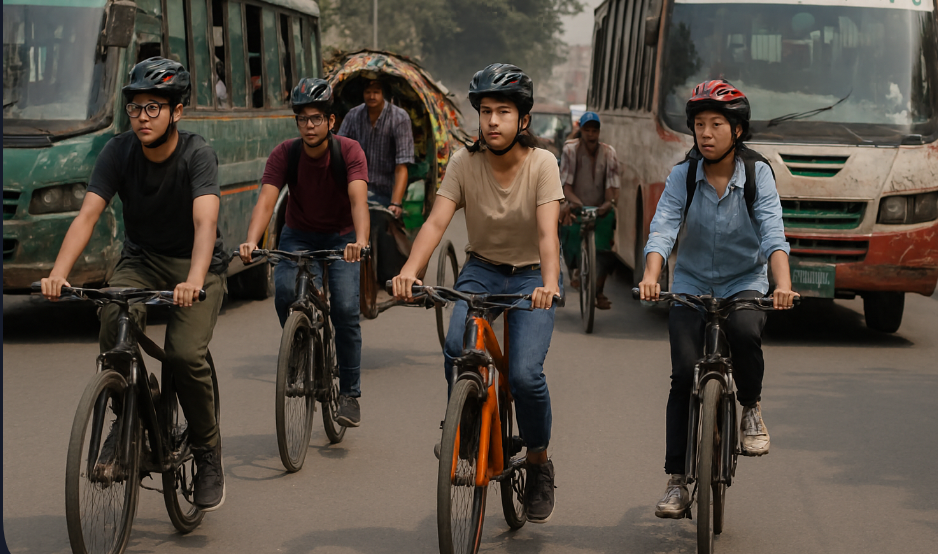The Growing Digital Storm Among Bangladeshi Youth

In today’s Bangladesh, digital technology has transformed how young people live, learn, and communicate. Smartphones, social media, and online entertainment are now inseparable parts of youth culture. According to the Bangladesh Telecommunication Regulatory Commission (BTRC), the country had over 135 million internet subscribers by 2025, with a majority being under 30 years old. While this digital boom brings opportunities for education and connection, it also creates new challenges- most notably, digital distractions that affect focus, learning, and mental health.
Every day, young people spend several hours scrolling through TikTok, YouTube, and Instagram. A 2025 Dhaka Tribune report revealed that Bangladeshi teenagers spend between five and eight hours daily on social media. This constant exposure to digital platforms has quietly reshaped how youth think, study, and interact.
The Meaning of Digital Distraction
Digital distraction occurs when technology steals attention from important tasks such as studying or working. It is the tendency to check phones repeatedly, switch between apps, or lose focus due to notifications. In Bangladesh, where low-cost smartphones and mobile internet are widely available, this issue has reached almost every home and classroom.
A study published in the International Journal of Social Science Research and Review in 2024 found that 75 percent of young respondents use the internet frequently, while 60 percent use it almost constantly. The same study showed that 70 percent of respondents believe digital dependency has negatively impacted their academic performance. Such findings reflect how easily technology can disrupt concentration, especially among students preparing for exams or university admissions.
Academic Consequences of Losing Focus
The academic effects of digital distractions are alarming. Many students report difficulty focusing during lectures or study sessions because of constant social media alerts. Researchers from the University of Dhaka observed that multitasking between study materials and entertainment apps reduces comprehension and memory retention.
In another survey conducted by BRAC University, over two-thirds of students admitted to losing track of time while browsing social media. The Asian Journal of Education and Social Studies published data showing that students who spend more than four hours online daily tend to score lower grades.
These distractions not only harm academic performance but also create anxiety about deadlines and poor results. The cycle of stress and distraction continues when students turn to digital entertainment to escape, deepening their dependency.
The Mental and Emotional Cost
Beyond academics, digital distractions carry emotional consequences. Continuous screen use can lead to insomnia, depression, and emotional fatigue. The 2024 Dhaka Metropolitan Study on Youth Digital Dependency reported that 55.6 percent of participants suffer from insomnia due to excessive device use. About 16 percent experienced anxiety, while 27.8 percent reported frequent irritation and mood swings.
Mental health experts from the National Institute of Mental Health Bangladesh emphasize that these patterns mirror digital addiction seen in other countries. Many young people compare their lives to idealized social media posts, which leads to dissatisfaction and loss of self-esteem. Moreover, excessive online activity often replaces outdoor interaction, deepening feelings of isolation even among socially active users.
Changing Youth Culture in a Connected Nation
Bangladeshi youth culture is now inseparable from the digital world. Popular apps like TikTok, Snapchat, and Facebook Reels shape trends, language, and aspirations. The influence of viral content extends to rural areas, where smartphone use has grown rapidly thanks to improved 4G access.
However, this digital shift also reduces time spent with family and friends in real-life settings. The Daily Star reported that family conversations have declined in many households because everyone is busy with screens. Even in classrooms, students often multitask—watching videos while pretending to take notes. Teachers across the country now face the challenge of keeping students engaged amid constant technological temptation.
The Productivity Trap
Digital distractions are not limited to students. Young professionals in Bangladesh are also facing the same challenge. The constant urge to check emails or messages during work hours disrupts productivity and focus. A 2023 LinkedIn survey on workplace efficiency found that 64 percent of Bangladeshi professionals under 30 admitted losing focus multiple times daily because of smartphone notifications.
In creative industries such as digital marketing, content creation, and freelancing, these interruptions are especially harmful. Success in such fields requires long, focused hours, yet young workers often juggle multiple screens, reducing their efficiency. Employers report growing concern about attention fatigue and burnout among fresh graduates.
The Health Impact of Constant Screen Time
Excessive screen time contributes to serious health issues. The World Health Organization (WHO) warns that digital addiction causes poor sleep, eye strain, and obesity among youth. In Bangladesh, many young people complain of headaches and blurred vision after long hours of mobile use.
A 2024 health report from Bangabandhu Sheikh Mujib Medical University found that students spending more than six hours online daily show higher levels of eye dryness and fatigue. Lack of physical activity worsens the problem, increasing risks of posture-related pain and weight gain.
These health concerns highlight why digital balance is crucial for both body and mind.
Why Youth Find It Hard to Disconnect
There are psychological reasons behind the constant urge to check phones. Social media platforms are designed to trigger dopamine, the brain’s pleasure chemical. Every like, share, or comment gives a sense of reward, encouraging users to keep scrolling.
In Bangladesh, where many young people face stress from academic competition and job uncertainty, online engagement provides temporary escape. The problem is that these moments of relief quickly turn into dependency. Researchers from the ICT Division of Bangladesh note that one in five young users shows signs of problematic internet use, particularly through gaming and social networking.
Finding the Balance in the Digital Age
Digital technology itself is not the enemy. It becomes harmful when used without control. The goal is to achieve digital balance- using technology as a tool, not as a trap. Experts from the Bangladesh Institute of ICT in Development (BIID) recommend that schools introduce digital literacy programs to teach time management and mindfulness.
Parents can also play a key role by setting screen limits and promoting outdoor activities. Universities should establish technology-free zones where students can interact face-to-face. Even small steps, like turning off notifications during study sessions, can make a big difference.
Apps that track screen time, such as Google Digital Wellbeing and Apple Screen Time, help users understand their habits and regain focus. Many Bangladeshi youth are already using these tools to reduce overuse.
The Positive Side of the Digital World
Despite the risks, the digital world offers endless opportunities. Thousands of Bangladeshi youth now earn through freelancing, YouTube, and online entrepreneurship. Platforms like Coursera and Khan Academy allow students to learn new skills from home.
The challenge is to distinguish between productive digital engagement and distraction. When used wisely, technology can empower youth with education, global exposure, and creative freedom. As Bangladesh advances toward its Smart Bangladesh vision, digital literacy will define how successfully its young population adapts to the future.
Building a Mindful Digital Future
The future of Bangladesh depends on a generation that can use technology wisely. Schools, parents, and policymakers must recognize that digital distractions are not just personal issues but social ones. National awareness campaigns can encourage young people to practice mindfulness, limit screen time, and engage more in real-world connections.
The UNICEF Bangladesh campaign on online safety already promotes responsible internet use. Expanding such initiatives to include awareness about attention and productivity could reshape how youth interact with technology.
Bangladesh has one of the world’s most promising young populations. With proper guidance, they can turn digital access into digital excellence-where focus, discipline, and creativity define their success.







